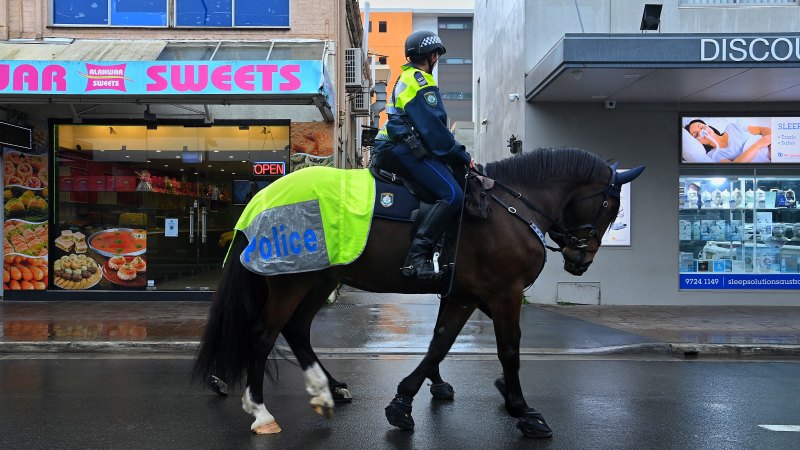Save articles for later
Add articles to your saved list and come back to them any time.
Evidence used to justify lockdowns and other pandemic interventions will be examined by the federal COVID-19 inquiry in an expansion of its scope, after the Albanese government was roundly criticised for omitting state government decisions from its remit.
A new detail on the inquiry’s website reveals it will consider how evidence was used to make decisions about “interventions, such as lockdowns, in different jurisdictions across Australia”.
NSW Mounted Police patrolling the streets of Fairfield during the 2021 Delta lockdown.Credit: Kate Geraghty
That explicit instruction was not in the original terms of reference, suggesting the three experts leading the inquiry believe there should be particular scrutiny of the way evidence was used to make decisions about lockdowns, school shutdowns and border closures.
It comes after the Albanese government’s COVID inquiry – held instead of a royal commission – was labelled a protection racket for Labor premiers by the federal opposition because of its weak powers and controversial decision to exclude the unilateral decisions of state governments from its scope.
While that exemption remains – and individual state decisions about the strictness and severity of lockdowns will not be investigated – the subtle shift in the terms allows the inquiry to probe whether these decisions were driven by sufficient evidence.
Some of the more restrictive elements of Australia’s pandemic response – such as five-kilometre movement restrictions, time limits on outdoor exercise and evening curfews – were at times made on inconclusive evidence. The efficacy of curfews has been contested in several scientific studies across the world.
The panel is not expected to make methodical assessments of individual decisions but will highlight examples of when evidence was or was not applied, to improve decision-making in future.
Health economist and former Health Department head, Stephen Duckett, said it was a welcome shift.
“There were some decisions where the evidence was very weak. The curfews, for example, were not evidence-based, but restrictions on movement generally were,” he said.
“It’s important to review the pathway from the evidence to the decision, to ensure the public has confidence in the public health system in this country. It will also be important to look at how different states, faced with the same evidence, came to different decisions.”
The inquiry Prime Minister Anthony Albanese announced in September acted on his election promise but fell short of public expectations and was criticised by human rights commissioner Lorraine Finlay for lacking the power of a royal commission to compel documents or call witnesses.
By contrast, the United Kingdom’s wide-ranging and years-long COVID inquiry has recently heard testimony from former aides to then-prime minister Boris Johnson, and pored over previously secret WhatsApp messages and internal government emails, to pick apart how and why decisions were made.
The evidence has been described as a remarkable insight into bitter divisions, but also as a trial of Johnson himself – an outcome Albanese wanted to avoid as he emphasised the inquiry would be about looking forward, not backwards.
Johnson is due to give evidence in person later this year and in his written submission said he had reflected on whether lockdowns had done more harm than good.
The panel of experts appointed to lead Australia’s 12-month inquiry – Robyn Kruk, Professor Catherine Bennett and Dr Angela Jackson – will invite government and community stakeholders to make submissions but will not be able to force them to comply.
Former state decision-makers such as Dominic Perrottet, who was part of the NSW government’s crisis cabinet as both treasurer and premier, and then-Victorian chief health officer Brett Sutton have volunteered to give evidence. But the panel is unlikely to hold public hearings, despite Health Minister Mark Butler saying “it would be unusual not to”.
Bennett said the inquiry was interested in the evidence itself, how it was used by governments, and how it was collected during a crisis.
“It’s not the inquiry’s job to interrogate why a lockdown happened in a particular setting, but the way evidence was used in the process of [that] decision-making,” she said.
“A lot of evidence has also been produced after the fact, so it’s about gaining a broader understanding of longer-terms impacts and setting up systems in the future.”
She said the elaborated description on the inquiry’s website was intended to invite a wide range of submissions and help people understand the full scope of the investigation.
A statement from Kruk, Bennett and Jackson said the pandemic had been the most significant crisis Australians had faced in decades, with vast health, social and economic impacts.
“Unfortunately, the weight of these impacts fell disproportionately on particular communities,” they said.
“With a focus on evidence-based policy and practice, the inquiry will look at information generation and sharing to ensure that Australia will be prepared for future pandemic threats, and that future pandemic responses are tailored to meet the varying needs of Australia’s diverse communities.”
Submissions to the inquiry opened on Monday.
Cut through the noise of federal politics with news, views and expert analysis from Jacqueline Maley. Subscribers can sign up to our weekly Inside Politics newsletter here.
Most Viewed in Politics
From our partners
Source: Read Full Article




